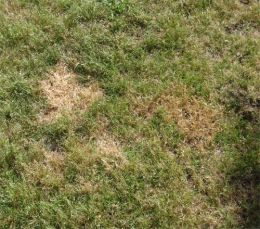The urine of dogs
Animals and especially female dogs, can cause considerable damage by urinating on the lawn.The smell animal urine contains salts, urea and other soluble soluble.
The salt content determines the extent of the damage. When the salt content of the urine is low and the soil affected is moist, the damage can be minimal and is just a fastest-growing of the grass dark green in the affected area. However, when the salt content is high and the lawn is dry, there is strong potential for damage. There will be a patch of dead grass yellow and bright, surrounded by grass dark green that grows quickly.
The damage is staggering and is the same that you would get by throwing salt on the lawn. The only difference is that in these cases there is a margin of green grass that grows the most luxuriant around the patch of dead grass.

THINGS TO DO TO TREAT THE DAMAGED AREAS AND TO PREVENT FURTHER DAMAGE
The damage done by the urine of the dog is generally permanent and there is no remedy for the plants damaged. Sometimes if the damage is not significant, watering the area will help to reduce the concentration of the salt, but you will probably have to rake up and traseminare the damaged area.
When he lives a dog in the garden, it is really difficult to prevent this type of damage. The watering of the area after the dog urine will help to disperse the salts but it is certainly not convenient to have to constantly monitor if the dog urine to immediately intervene with the irrigation. If practical and possible, the best solution would be to train the dog to urinate in a specific area where it would not create damage or where the damage would be limited.
The damage done by the urine of the dog is generally permanent and there is no remedy for the plants damaged. Sometimes if the damage is not significant, watering the area will help to reduce the concentration of the salt, but you will probably have to rake up and traseminare the damaged area.
When he lives a dog in the garden, it is really difficult to prevent this type of damage. The watering of the area after the dog urine will help to disperse the salts but it is certainly not convenient to have to constantly monitor if the dog urine to immediately intervene with the irrigation. If practical and possible, the best solution would be to train the dog to urinate in a specific area where it would not create damage or where the damage would be limited.
